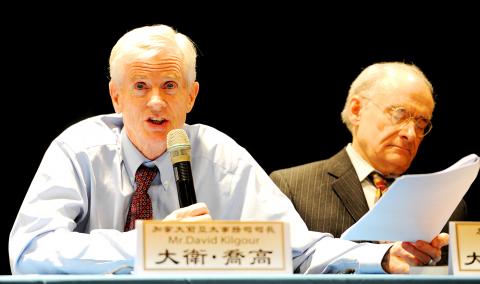Despite economic growth, the condition of human rights in China is still very bad — especially when it comes to the persecution of religious and minority groups by the Chinese Communist Party (CCP) — participants at a conference on human rights in China said yesterday, calling on Taiwanese to pay more attention to human rights issues in China.
“Taiwanese are not paying enough attention to issues related to human rights and democracy in China, and I think the first thing we can do to help China democratize is show more concern,” said Maysing Yang (楊黃美幸), deputy executive director of Taiwan Foundation for Democracy, a sponsor of the conference organized by the Association for Free Communication.
A large number of people might not care much about human rights in China because of China’s hostility to Taiwan, she said, “but we should be opposed to the authoritarian regime, not the people.”

Photo: Lo Pei-der, Taipei Times
China’s democratization would be beneficial to Taiwan’s national interests, Yang said.
“Pressure from the outside would actually work,” Yang said. “For instance, the conditional release of [Chinese dissident] Ai Weiwei (艾未未) was the result of international pressure.”
Among the different forms of human rights violations, David Matas, Canada-based human rights attorney and co-author of Report into Allegations of Organ Harvesting of Falun Gong Practitioners in China, said that live organ harvesting of Falun Gong practitioners in China was probably the most horrible and the hardest to investigate.
“There are no bodies of victims [in live organ harvesting], because when they are dead, their bodies are cremated; there are no witnesses, because there are only the perpetrators and the victims; there are no crime scenes, because it usually takes place in operation rooms or mobile vehicles that are cleaned right away,” Matas said, adding that organs harvested from Falun Gong practitioners are usually sold at high prices to people awaiting organ transplants in China or abroad.
Falun Gong practitioners are chosen as victims of live organ harvesting because Falun Gong is a banned movement in China, Matas said.
Another co-author of the book, David Kilgour, who is also a former member of the Canadian parliament, said that more than two-thirds of torture victims in China are Falun Gong practitioners, while the group also made up about 50 percent of the detainees at labor camps.
Persecution of religions groups does not stop with Falun Gong, Kilgour said, “Tibetan Buddhists, Muslims and Christians are often victims as well.”
Yang Hsien-hung (楊憲宏), a political commentator and chairman of the Taiwan Association for China’s Human Rights, agreed with Kilgour.
He said he was stunned when he attended a sermon by a Chinese Christian group that visited Taiwan.
In stead of urging his followers to follow God’s lead, Yang said, the preacher “urged Chinese Christians to follow the guidance of the CCP.”

Taiwanese can file complaints with the Tourism Administration to report travel agencies if their activities caused termination of a person’s citizenship, Mainland Affairs Council Minister Chiu Chui-cheng (邱垂正) said yesterday, after a podcaster highlighted a case in which a person’s citizenship was canceled for receiving a single-use Chinese passport to enter Russia. The council is aware of incidents in which people who signed up through Chinese travel agencies for tours of Russia were told they could obtain Russian visas and fast-track border clearance, Chiu told reporters on the sidelines of an event in Taipei. However, the travel agencies actually applied

New measures aimed at making Taiwan more attractive to foreign professionals came into effect this month, the National Development Council said yesterday. Among the changes, international students at Taiwanese universities would be able to work in Taiwan without a work permit in the two years after they graduate, explainer materials provided by the council said. In addition, foreign nationals who graduated from one of the world’s top 200 universities within the past five years can also apply for a two-year open work permit. Previously, those graduates would have needed to apply for a work permit using point-based criteria or have a Taiwanese company

The Shilin District Prosecutors’ Office yesterday indicted two Taiwanese and issued a wanted notice for Pete Liu (劉作虎), founder of Shenzhen-based smartphone manufacturer OnePlus Technology Co (萬普拉斯科技), for allegedly contravening the Act Governing Relations Between the People of the Taiwan Area and the Mainland Area (臺灣地區與大陸地區人民關係條例) by poaching 70 engineers in Taiwan. Liu allegedly traveled to Taiwan at the end of 2014 and met with a Taiwanese man surnamed Lin (林) to discuss establishing a mobile software research and development (R&D) team in Taiwan, prosecutors said. Without approval from the government, Lin, following Liu’s instructions, recruited more than 70 software

Chinese spouse and influencer Guan Guan’s (關關) residency permit has been revoked for repeatedly posting pro-China videos that threaten national security, the National Immigration Agency confirmed today. Guan Guan has said many controversial statements in her videos posted to Douyin (抖音), including “the red flag will soon be painted all over Taiwan” and “Taiwan is an inseparable part of China,” and expressing hope for expedited reunification. The agency last year received multiple reports alleging that Guan Guan had advocated for armed reunification. After verifying the reports, the agency last month issued a notice requiring her to appear and explain her actions. Guan